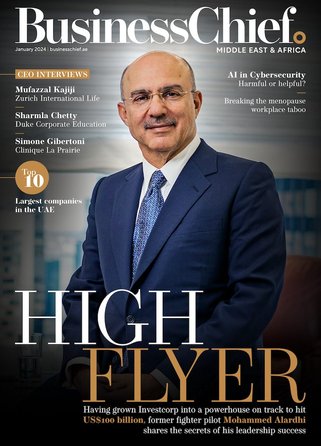How UAE business can best keep and cultivate Emirati leaders

When I first arrived in Dubai in 1995 as a British expat, the workforce was unmistakably split – expats worked in private business, UAE nationals in the public sector.
Fast forward nearly three decades and the picture is quite different with more than 81,000 Emiratis integrated into the private sector.
It’s an achievement largely driven by Emiratisation, an initiative first introduced by the UAE government in 1998 to raise representation in the workforce – and then relaunched more than a decade ago with a focus on the private sector.
But while nationalisation in UAE private business has largely lagged in the decade since, more recent efforts and policy rulings have pushed Emirati representation to record highs in 2023 – climbing almost three-fold (57%) from the year before, according to the MoHRE.
This means that more than 17,000 private-sector companies now employ 81,000 UAE nationals – around 4% of the Emirati population.
As impressive as the numbers are, it remains that locals still only account for 4% of private-sector employees despite making up 11.5% of the country’s population.
“While there is a high concentration of Emiratis in the public sector, the nationalisation rate is disproportionately low across economic sectors compared to the overall UAE population,” says Khaled Bin Braik, PwC’s first homegrown UAE Consulting Partner at PwC Middle East.
Khaled, who spearheads PwC’s award-winning Emiratisation Programme Watani, tells Business Chief that the onus is now on private-sector leaders to take up the challenge.
“This means transitioning from playing a supporting role to a leading one in driving nationalisation,” he urges.
The fact that more than 440 private companies were recently hit with fines for failing to meet targets of 3% national representation by July 7 gives an indication of just how far business needs to travel.
It’s not just about hitting Emiratisation targets but maintaining them – and that means investing in national talent to ensure retention, satisfaction and progression.
“There is a need to invest in future skills to prepare young Emiratis for the future of work and develop the next generation of leaders who can drive the UAE’s transformation into a green, digital and knowledge-based economy,” Khaled tells Business Chief.
Recent groundbreaking research from PwC Middle East shows that while interest in private-sector employment among younger Emiratis is growing, many nationals choose to return to the public sector – with two-thirds of those currently working in private companies considering such a move.
Among the reasons, 20% cite dissatisfaction with the compensation and benefits packages compared to public-sector peers, while 62% of graduates perceive it more of a challenge to secure employment in the private sector.
Khaled insists that understanding and responding to the preconceptions and preferences of Emirati employees is “crucial if employers are to break down traditional barriers and secure the strongest appointments long-term”.
He urges businesses to be more proactive in attracting, developing, and retaining national talent and points to various initiatives, including reimagining learning pathways to provide the right development opportunities and environment for nationals to grow and thrive.
Among other retention pointers, Khaled suggests creating personalised reward programmes to recognise the contribution of nationals, redefining performance management to deliver accelerated career journeys, and introducing career conversion programmes to open up more resilient pathways.
And given PwC research finds 8 in 10 Emirati graduates surveyed have a desire to develop entrepreneurial skills, Khaled urges companies to provide opportunities for entrepreneurial ventures – enabling talent to “maintain high levels of job stability whilst mitigating the financial risks”, and to eventually become self-employed or grow their own business.
These aren’t pie-in-the-sky pointers, either, but ones that have been road-tested and proven successful as part of PwC’s own firm-wide Emiratisation strategy – which the Big Four firm has been working on since 2012 with its Watani Programme.
Supporting UAE national talent development across their entire career journey, Watani offers a range of dedicated programmes, facilitates client exchanges, and provides comprehensive training opportunities. It is further supplemented by STEP, which supports talent development of UAE client’s future leaders via secondment opportunities into PwC.
“By prioritising the development of local talent, we are also helping to upskill the region’s broader talent pool and better prepare them for the workforce needs of the future.”
And the numbers speak for themselves, with national representation at PwC Middle East doubling since 2019 to 1,200 UAE employees in 14 offices across the GCC.
Not only that, but close to 50% of PwC’s national workforce is female, and more than 6,000 Emiratis have been trained in the firm’s Academy over the last decade, in everything from leadership to data analytics.
Little wonder then that PwC is considered the sector pioneer for professional services firms when it comes to nationalisation, securing the Best Emiratisation Supporting Entity award by MoHRE in 2020; and for its Watani Programme, and landing Best Nationalisation Initiative in the Private Sector in the GCC GOV HR Awards in 2022.
Further proof of PwC’s success in embracing and developing nationals, Senior Associate in the Deals practice Abdalrahman Bin Kharbash was recently recognised at the government-backed Nafis Awards as the UAE’s best Emirati talent in private-sector finance.
Joining PwC’s Watani programme in June 2019, Dubai-based Abdalrahman chose the private sector route as he feels it is “the perfect platform to showcase my skill set” and believes in the UAE vision of Emiratis taking ownership to solve many of the challenges the country faces.
Empowered to take an active role in working with high-profile clients and complex engagements, Abdalrahman has been at the forefront of the development and betterment of the country and region. In leadership too, he has been encouraged to take key decisions and ownership, and to learn to apply his leadership mindset in real and impactful situations.
“PwC understands that an ambitious nation requires leaders across all sectors to drive it toward growth and they have developed a tailored Emiratisation programme that is far more than simply ticking boxes,” he tells Business Chief.
Four years on and Abdalrahman not only serves as Senior Associate in PwC’s Deals practice, helping organisations with M&A and IPOs, but is also the Vice Chair of PwC’s first-ever Youth Council, where he plays a key role in developing strategies and plans for local talent acquisition, development, and retention to support PwC’s ambitious strategy in creating a pipeline of future national leaders.
“I aim to take on the bigger challenge of driving real contribution to our firm’s nationalisation agenda and turning the needle on a very strategic topic for the UAE.”
With 61% of Emirati graduates expressing interest in securing employment in the private sector, according to PwC research – what then can businesses then do to ensure they not only attract but retain talent?
The businesses most likely to succeed are those demonstrating a clear and effective plan to invest in Emirati talent for their individual growth, something Abdulrahman says can be achieved via both internal growth plans (upskilling, coaching and leadership opportunities) and external plans, from supplementing tuition to supporting professional qualifications.
Abdalrahman points to PwC’s career coach programme, where Emiratis are challenged to set ambitious goals for themselves every year and are held accountable for those goals.
Transparency is essential too, with the outlining of clear pathways to career success giving Emiratis an understanding of what the future might hold for them.
Finally, Abdulrahman suggests private sector firms engage in authentic and genuine conversations with national recruits, to understand their needs and to assuage graduate fears about the private sector.
“Many in the prospective Emirati talent pool feel they are taking a big leap moving from the public sector – and the private sector can feel alien and daunting. Understanding and dissuading their fears can help them to better visualise a future there.”
Armed with such tactics, the revised rules requiring businesses to increase their UAE national count by 2% each year – reaching 10% by 2026 – is not only possible, but if PwC Middle East is anything to go by – highly probable.
Recent groundbreaking research from PwC Middle East shows that while interest in private-sector employment among younger Emiratis is growing, many nationals choose to return to the public sector – with two-thirds of those currently working in private companies considering such a move.
Among the reasons, 20% cite dissatisfaction with the compensation and benefits packages compared to public-sector peers, while 62% of graduates perceive it more of a challenge to secure employment in the private sector.
Khaled insists that understanding and responding to the preconceptions and preferences of Emirati employees is “crucial if employers are to break down traditional barriers and secure the strongest appointments long-term”.
He urges businesses to be more proactive in attracting, developing, and retaining national talent and points to various initiatives, including reimagining learning pathways to provide the right development opportunities and environment for nationals to grow and thrive.
Among other retention pointers, Khaled suggests creating personalised reward programmes to recognise the contribution of nationals, redefining performance management to deliver accelerated career journeys, and introducing career conversion programmes to open up more resilient pathways.
And given PwC research finds 8 in 10 Emirati graduates surveyed have a desire to develop entrepreneurial skills, Khaled urges companies to provide opportunities for entrepreneurial ventures – enabling talent to “maintain high levels of job stability whilst mitigating the financial risks”, and to eventually become self-employed or grow their own business.
These aren’t pie-in-the-sky pointers, either, but ones that have been road-tested and proven successful as part of PwC’s own firm-wide Emiratisation strategy – which the Big Four firm has been working on since 2012 with its Watani Programme.
Supporting UAE national talent development across their entire career journey, Watani offers a range of dedicated programmes, facilitates client exchanges, and provides comprehensive training opportunities. It is further supplemented by STEP, which supports talent development of UAE client’s future leaders via secondment opportunities into PwC.
“By prioritising the development of local talent, we are also helping to upskill the region’s broader talent pool and better prepare them for the workforce needs of the future.”
PwC leading charge on Emiratisation
And the numbers speak for themselves, with national representation at PwC Middle East doubling since 2019 to 1,200 UAE employees in 14 offices across the GCC.
Not only that, but close to 50% of PwC’s national workforce is female, and more than 6,000 Emiratis have been trained in the firm’s Academy over the last decade, in everything from leadership to data analytics.
Little wonder then that PwC is considered the sector pioneer for professional services firms when it comes to nationalisation, securing the Best Emiratisation Supporting Entity award by MoHRE in 2020; and for its Watani Programme, and landing Best Nationalisation Initiative in the Private Sector in the GCC GOV HR Awards in 2022.
Further proof of PwC’s success in embracing and developing nationals, Senior Associate in the Deals practice Abdalrahman Bin Kharbash was recently recognised at the government-backed Nafis Awards as the UAE’s best Emirati talent in private-sector finance.
Joining PwC’s Watani programme in June 2019, Dubai-based Abdalrahman chose the private sector route as he feels it is “the perfect platform to showcase my skill set” and believes in the UAE vision of Emiratis taking ownership to solve many of the challenges the country faces.
Empowered to take an active role in working with high-profile clients and complex engagements, Abdalrahman has been at the forefront of the development and betterment of the country and region. In leadership too, he has been encouraged to take key decisions and ownership, and to learn to apply his leadership mindset in real and impactful situations.
“PwC understands that an ambitious nation requires leaders across all sectors to drive it toward growth and they have developed a tailored Emiratisation programme that is far more than simply ticking boxes,” he tells Business Chief.
Four years on and Abdalrahman not only serves as Senior Associate in PwC’s Deals practice, helping organisations with M&A and IPOs, but is also the Vice Chair of PwC’s first-ever Youth Council, where he plays a key role in developing strategies and plans for local talent acquisition, development, and retention to support PwC’s ambitious strategy in creating a pipeline of future national leaders.
With 61% of Emirati graduates expressing interest in securing employment in the private sector, according to PwC research – what then can businesses then do to ensure they not only attract but retain talent?
The businesses most likely to succeed are those demonstrating a clear and effective plan to invest in Emirati talent for their individual growth, something Abdulrahman says can be achieved via both internal growth plans (upskilling, coaching and leadership opportunities) and external plans, from supplementing tuition to supporting professional qualifications.
Abdalrahman points to PwC’s career coach programme, where Emiratis are challenged to set ambitious goals for themselves every year and are held accountable for those goals.
Transparency is essential too, with the outlining of clear pathways to career success giving Emiratis an understanding of what the future might hold for them.
Finally, Abdulrahman suggests private sector firms engage in authentic and genuine conversations with national recruits, to understand their needs and to assuage graduate fears about the private sector.
“Many in the prospective Emirati talent pool feel they are taking a big leap moving from the public sector – and the private sector can feel alien and daunting. Understanding and dissuading their fears can help them to better visualise a future there.”
Armed with such tactics, the revised rules requiring businesses to increase their UAE national count by 2% each year – reaching 10% by 2026 – is not only possible, but if PwC Middle East is anything to go by – highly probable.
Four years on and Abdalrahman not only serves as Senior Associate in PwC’s Deals practice, helping organisations with M&A and IPOs, but is also the Vice Chair of PwC’s first-ever Youth Council, where he plays a key role in developing strategies and plans for local talent acquisition, development, and retention to support PwC’s ambitious strategy in creating a pipeline of future national leaders.
With 61% of Emirati graduates expressing interest in securing employment in the private sector, according to PwC research – what then can businesses then do to ensure they not only attract but retain talent?
The businesses most likely to succeed are those demonstrating a clear and effective plan to invest in Emirati talent for their individual growth, something Abdulrahman says can be achieved via both internal growth plans (upskilling, coaching and leadership opportunities) and external plans, from supplementing tuition to supporting professional qualifications.
Abdalrahman points to PwC’s career coach programme, where Emiratis are challenged to set ambitious goals for themselves every year and are held accountable for those goals.
Transparency is essential too, with the outlining of clear pathways to career success giving Emiratis an understanding of what the future might hold for them.
Finally, Abdulrahman suggests private sector firms engage in authentic and genuine conversations with national recruits, to understand their needs and to assuage graduate fears about the private sector.
“Many in the prospective Emirati talent pool feel they are taking a big leap moving from the public sector – and the private sector can feel alien and daunting. Understanding and dissuading their fears can help them to better visualise a future there.”
Armed with such tactics, the revised rules requiring businesses to increase their UAE national count by 2% each year – reaching 10% by 2026 – is not only possible, but if PwC Middle East is anything to go by – highly probable.
How can the private sector attract, develop and retain talent?
Khaled Bin Braik, PwC’s first homegrown UAE Consulting Partner urges the private sector to be more proactive in attracting, developing and retaining national talent. He outlines these considerations:
1 Develop a purpose-driven nationalisation agenda by embedding targets and provisions into talent strategies
2 Leverage diversified and optimal sourcing channels to identify, evaluate, recruit and onboard nationals across different segments
3 Reimagine learning pathways to provide the right environment for nationals to thrive
4 Create personalised reward programmes to recognise contributions and reward them fairly and equitably
5 Enable effective transition and mobility by introducing reskilling and career conversion programmes
6 Leverage technology and data analytics to drive better decision-making through evidence-backed nationalisation interventions
7 Offer opportunities for entrepreneurial ventures within the boundaries of the corporate (intrapreneurship), enabling nationals to maintain high levels of job stability whilst mitigating financial risks.
Featured Articles
SAP has announced it has appointed a new President for a newly-created EMEA region, aiming to make the most of the opportunities of cloud and AI
technology
From fighter pilot to fashion house financier, Mohammed Alardhi has taken Investcorp to great heights – so what’s the secret to his success?
Dr Omar Al-Attas, Head of Environmental Protection and Regeneration at Red Sea Global, shares his COP28 hopes and approach to regenerative tourism
strategy




